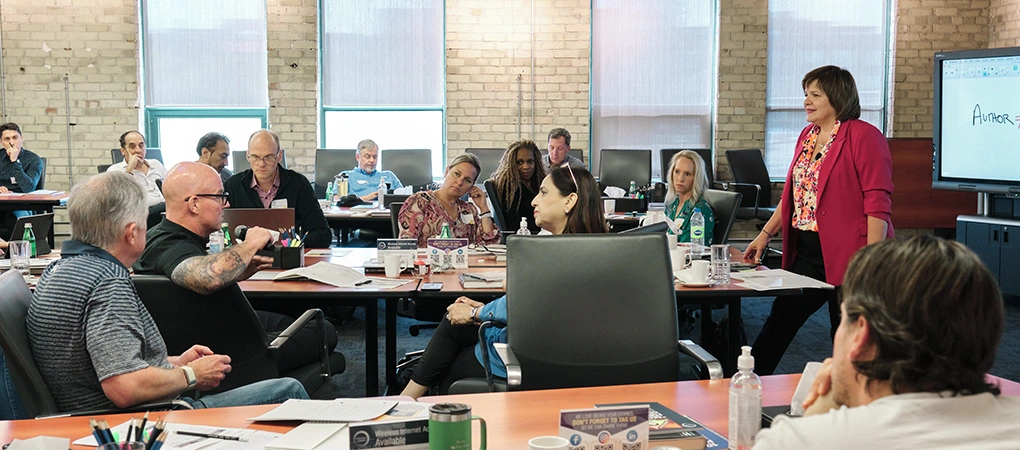Always Be Growing: The 4 Pillars Of A Successful Business
Shannon Waller

Listen to the podcast below or subscribe to the Team Success Podcast on iTunes.
Extraordinary Coach Culture: Constant Improvement & Innovation
We work with thousands of successful entrepreneurs every year here at Strategic Coach, and they all share one quality I attribute to their achievements, regardless of their industry, experience, or income: They’re always looking to grow.
Every one of them wants to grow their business and their success. They also want to grow their teamwork, their value, and their contributions, along with their free time and quality of life.
But growth doesn’t happen without effort. It happens when you build it into your DNA and that of your company. You have to always be on the lookout for ways to improve and innovate.
That’s what keeps you fresh and paying attention. It’s what keeps you competitive in the marketplace. Because if you’re not evolving, you’re being left behind.
So what can entrepreneurs do to cultivate a growth mindset? How can they always be improving and innovating?
It’s all about doing things faster, easier, cheaper, and bigger/better!
1. Faster
If you can take a process that usually demands 25 hours of person power and reduce it to, say, four hours, you’ve freed up a ton of time, energy, and creative potential. You’ve also immediately made it more profitable.
While this will occasionally come down to the team members involved, since someone who’s great at a particular task and loves doing it (in other words, someone working in their Unique Ability) will inevitably be more efficient than someone who’s dragging their feet for lack of interest, skill, or both, oftentimes it’s just a matter of automating.
Here at Coach, for example, our incredibly talented and responsible administrative team handles all the correspondence, materials, shipping, and logistics for over 500 workshops a year, in eight different cities and three different countries … yet that team hasn’t grown substantially in years.
This amazing feat has been made possible by our tech team. Thanks to their programming, many of the processes that used to be done manually—processes that were time-consuming and required a high degree of accuracy, but little in the way of creativity—are now automated.
Technology is great for these kinds of activities, because it frees people up to do work that requires innovation, creativity, and spontaneity. It frees them up to not only learn and grow, but produce bigger and better results for your company too.
2. Easier
I think people sometimes get scared of the word “easier” because they assume that, for something to be worthwhile, it has to be difficult. But that’s how traditional employment works, not how entrepreneurs work.
Unlike most people, who operate in a Time-and-Effort Economy—the more hours you put in and the harder you grind, the more you get paid—entrepreneurs live in a much riskier (but ultimately more rewarding) world known as the Results Economy. For entrepreneurs and, by extension, their team members, results are what matter, not how hard or how long you worked to get them.
That means it’s in everybody’s best interest to continually seek out ways to achieve the same results with less effort.
Sometimes technology will be the answer, and sometimes it’ll come down to right-fit team members, but a lot of times, it’s just a matter of streamlining.
Fortunately, we’ve got an amazing tool here at Coach called Unique Method that anyone can use to trim the excess fat off a process. Made up of 12 boxes arranged in a horseshoe shape, it simply asks you to outline the current steps of whatever process you’re analyzing, approximately how long each one takes, and who’s responsible for them.
By laying your process out graphically, you can easily and quickly see what choices to make.
Then you start identifying roadblocks. Where are things getting bogged down or slowing? Where are questions not getting answered?
Usually, laying out the obstacles will give you some insight into possible solutions. Can some steps be consolidated? Could technology do parts faster or fill in any gaps? Would another team member be a better fit?
When tasks are fun and easy, we do them quickly. When they’re hard and irritating, we procrastinate, whether consciously or not. For an entrepreneurial team to function and function well, you want every team member engaged in activities that are fun and easy, not hard and irritating.
Want more of Shannon Waller’s secrets to building growth right into your business? Download your free copy of her book The Team Success Handbook.
3. Cheaper
I hardly need to explain why it’s smart to reduce costs whenever possible, but it won’t happen without effort—and creativity!
I, for one, am terrible with negotiating. I just don’t have the nerve, patience, or tenacity it takes for that kind of conversation. But there are plenty of people on our team who live and breathe negotiation, and we rely on them to get the best prices possible.
If negotiating isn’t part of your skill set, send someone for whom it’s natural, even energizing!
Doing things cheaper might also come down to educating your team. Chances are, they have no idea how much things cost and are working on autopilot, doing things the way they’ve always been done. I’ve heard of companies doubling their productivity through this kind of financial literacy because their team members have the knowledge they need to make better decisions.
Throw in some kind of bonus or incentive program for producing the same results for less money and you’ll see even more amazing results.
Note: Only strive for cheaper as it relates to cost—never quality!
4. Bigger/Better
Achieving bigger and better results starts by asking questions. Questions like,
Can we do the same thing and get a bigger result? and
How can we increase our impact in a positive way?
Sometimes all it takes is a little tweak, a little enhancement, a little refinement to our process or our way of doing things to produce a big change. And one method we always return to when striving for these changes is The Experience Transformer, which is a thinking tool that allows us to capture the learning from both positive and negative experiences so we can repeat the former and avoid the latter.
Even when an experience is positive, there’s something that could be improved or refined, and while it might be easier to leave a negative experience behind us, they’re incredible opportunities for growth and learning. Instead of dwelling on our failures, we ask three questions that will transform them into successes:
- What worked?
- What didn’t work?
- If we could do this over knowing what we know now, how could we do it better?
By building this tool into your regular business process, you’ll not only avoid making the same mistakes twice, you’ll also develop the confidence to recognize future opportunities for success.
Bonus!
There’s another set of criteria to keep in mind when looking to amplify your results, and that relates to team members. Your best team players will have these four qualities:
- Alert: They’ve always got their antennae out, tuned in to your vision for the company, and they anticipate the next step to take.
- Curious: They’re interested in new ideas and are personally engaged in their work. They love to grow and improve.
- Responsive: They spring into action, even if it means dropping what they’re doing.
- Resourceful: They find and use the resources within and around themselves. They assemble what’s needed—without ego about where it came from.
Constant improvement and innovation.
Using technology, the Unique Method tool, Unique Ability Teamwork, and The Experience Transformer—all proven ways to get faster, easier, cheaper, and bigger results—you and your company can always be growing.







